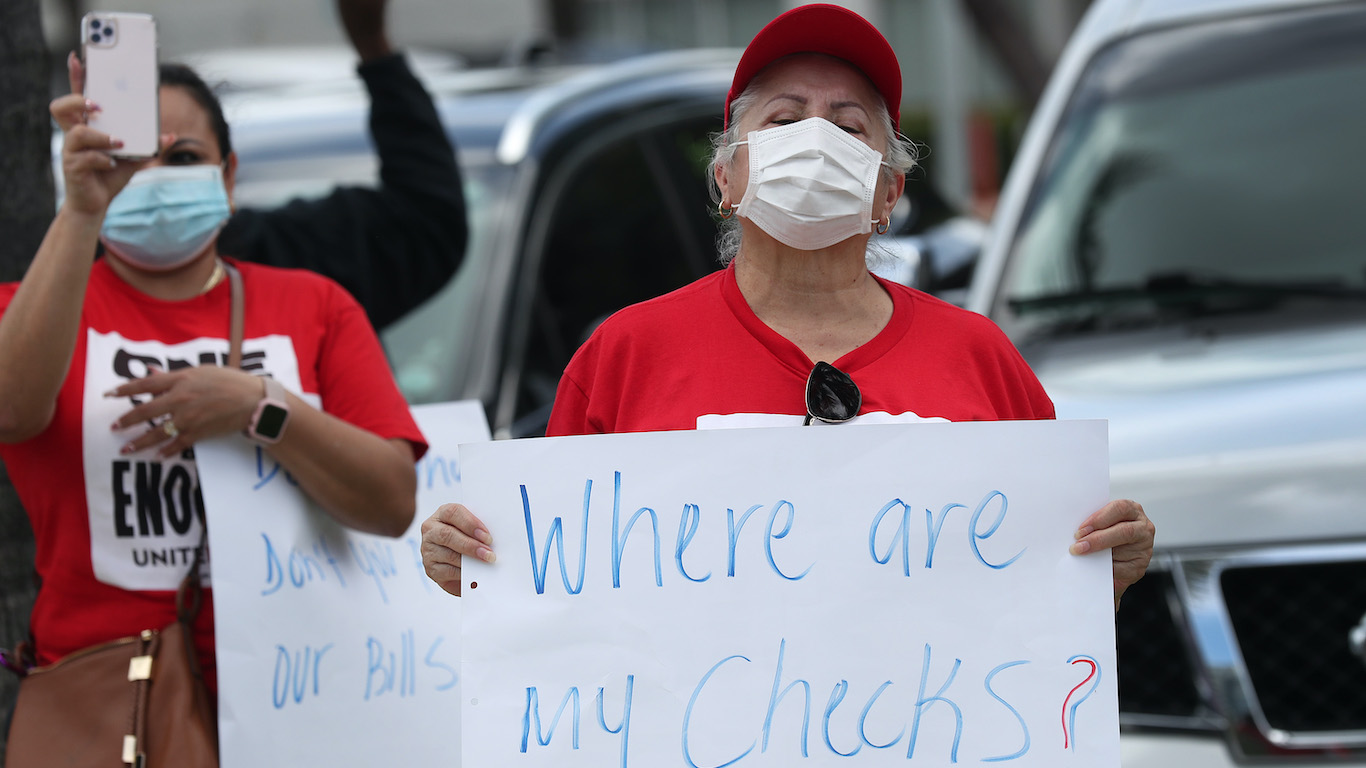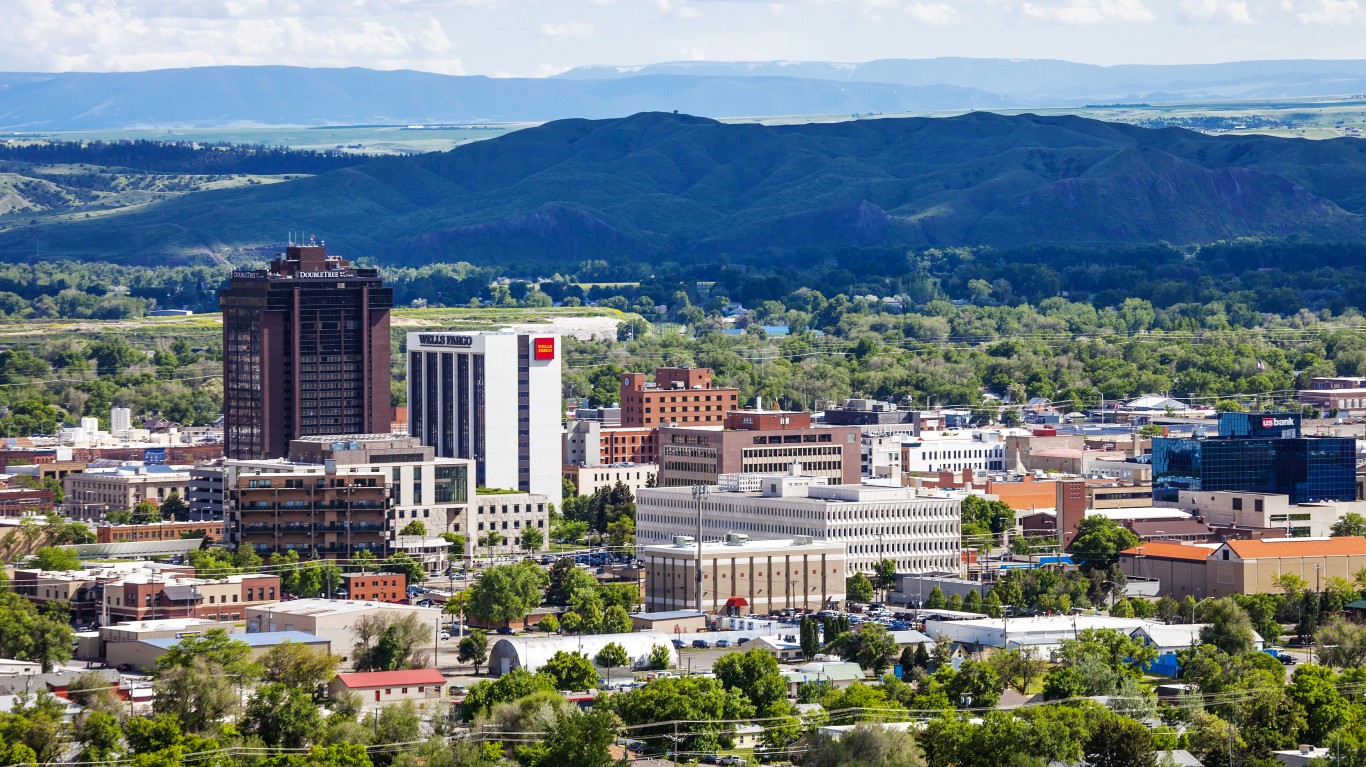Special Report
Every State's Unemployment Claims Since COVID-19 Shut the Economy Down

Published:

The latest weekly jobless claims figures were released on June 11. In the week ending June 6, yet another 1.5 million Americans filed for unemployment benefits as the unprecedented period of massive layoffs resulting from the COVID-19 pandemic extends to its 12th week.
While the number of new claims has fallen in recent weeks, the figures remain staggeringly high. For reference, during the Great Recession in 2009, weekly seasonally-adjusted unemployment claims peaked at 660,000. After the last 12 combined weeks of jobless claims, the number of Americans who have filed for unemployment since the coronavirus crisis began in earnest in mid-March is now approaching 40 million, or about 25% of the U.S. labor force.
As unemployment claims have continued to surge by the millions with each passing week, 24/7 Wall St. has been compiling a state-by-state review of jobless claims. Job losses by state range from the tens of thousands to the millions over the 12 weeks beginning on March 15, amounting to anywhere from 11% to nearly 50% of each state’s total labor force as measured before the pandemic hit.
While state unemployment rates for May have not yet been released, the Bureau of Labor Statistics recently released its estimate for the May national unemployment rate, which showed a surprising decline from 14.7% to 13.3%. The decline came with the news that 2.5 million jobs had been added in May after a loss of more than 20 million jobs in April. However, the Labor Department noted that a large share of fired workers had been misclassified as being employed when in fact they were furloughed, and the actual rate is roughly 3 percentage points higher.
Unemployment claims relative to the size of the workforce tend to be higher in states whose economies rely on industries that are bearing the brunt of the current economic downturn. These industries include leisure and hospitality, travel services, transportation and warehousing, and oil and gas extraction. Here is a look at the places a COVID-19 recession will likely hit hardest.
The current economic downturn is largely attributable to efforts to contain the spread of the coronavirus. Officials across the country have heeded advice from health experts and instituted a range of measures to facilitate social distancing, from shelter-in-place orders to closing nonessential businesses. Most of those states have begun to partially reopen their economies. Here are every state’s rules for staying at home and social distancing.
Click here to see every state’s unemployment claims since COVID-19 shut the economy down

Alabama
> Unemployment claims since mid-March: 567,445 (25th fewest)
> Unemployment claims relative to workforce: 25.3% of workforce (20th highest)
> April unemployment rate: 12.9% (25th highest)
> Most recent week’s unemployment claims (May 31 – June 6): 19,347 (24th fewest)
> Change in weekly claims from one year ago: +16,557 (+593.4%)
> Pre-COVID-19 pct. of workers in high-risk industries: 16.8% (21st lowest)
[in-text-ad]

Alaska
> Unemployment claims since mid-March: 118,921 (7th fewest)
> Unemployment claims relative to workforce: 34.4% of workforce (4th highest)
> April unemployment rate: 12.9% (25th highest)
> Most recent week’s unemployment claims (May 31 – June 6): 7,427 (16th fewest)
> Change in weekly claims from one year ago: +6,518 (+717.1%)
> Pre-COVID-19 pct. of workers in high-risk industries: 21.8% (4th highest)

Arizona
> Unemployment claims since mid-March: 651,593 (19th most)
> Unemployment claims relative to workforce: 18.6% of workforce (12th lowest)
> April unemployment rate: 12.6% (22nd lowest)
> Most recent week’s unemployment claims (May 31 – June 6): 22,879 (21st most)
> Change in weekly claims from one year ago: +18,209 (+389.9%)
> Pre-COVID-19 pct. of workers in high-risk industries: 19.3% (15th highest)

Arkansas
> Unemployment claims since mid-March: 244,862 (16th fewest)
> Unemployment claims relative to workforce: 18.0% of workforce (10th lowest)
> April unemployment rate: 10.2% (11th lowest)
> Most recent week’s unemployment claims (May 31 – June 6): 9,151 (18th fewest)
> Change in weekly claims from one year ago: +6,102 (+200.1%)
> Pre-COVID-19 pct. of workers in high-risk industries: 17.0% (23rd lowest)
[in-text-ad-2]

California
> Unemployment claims since mid-March: 5,109,402 (the most)
> Unemployment claims relative to workforce: 26.3% of workforce (17th highest)
> April unemployment rate: 15.5% (10th highest)
> Most recent week’s unemployment claims (May 31 – June 6): 258,060 (the most)
> Change in weekly claims from one year ago: +216,772 (+525.0%)
> Pre-COVID-19 pct. of workers in high-risk industries: 17.9% (22nd highest)

Colorado
> Unemployment claims since mid-March: 455,029 (22nd fewest)
> Unemployment claims relative to workforce: 14.6% of workforce (4th lowest)
> April unemployment rate: 11.3% (17th lowest)
> Most recent week’s unemployment claims (May 31 – June 6): 13,128 (20th fewest)
> Change in weekly claims from one year ago: +11,150 (+563.7%)
> Pre-COVID-19 pct. of workers in high-risk industries: 18.6% (19th highest)
[in-text-ad]

Connecticut
> Unemployment claims since mid-March: 403,959 (21st fewest)
> Unemployment claims relative to workforce: 21.3% of workforce (24th lowest)
> April unemployment rate: 7.9% (the lowest)
> Most recent week’s unemployment claims (May 31 – June 6): 15,279 (22nd fewest)
> Change in weekly claims from one year ago: +12,762 (+507.0%)
> Pre-COVID-19 pct. of workers in high-risk industries: 14.2% (the lowest)

Delaware
> Unemployment claims since mid-March: 106,578 (5th fewest)
> Unemployment claims relative to workforce: 22.1% of workforce (25th highest)
> April unemployment rate: 14.3% (21st highest)
> Most recent week’s unemployment claims (May 31 – June 6): 2,921 (6th fewest)
> Change in weekly claims from one year ago: +2,251 (+336.0%)
> Pre-COVID-19 pct. of workers in high-risk industries: 17.0% (22nd lowest)

Florida
> Unemployment claims since mid-March: 2,706,003 (2nd most)
> Unemployment claims relative to workforce: 26.3% of workforce (16th highest)
> April unemployment rate: 12.9% (25th highest)
> Most recent week’s unemployment claims (May 31 – June 6): 110,520 (3rd most)
> Change in weekly claims from one year ago: +101,939 (+1,188.0%)
> Pre-COVID-19 pct. of workers in high-risk industries: 20.1% (6th highest)
[in-text-ad-2]

Georgia
> Unemployment claims since mid-March: 2,529,184 (4th most)
> Unemployment claims relative to workforce: 49.5% of workforce (the highest)
> April unemployment rate: 11.9% (19th lowest)
> Most recent week’s unemployment claims (May 31 – June 6): 134,711 (2nd most)
> Change in weekly claims from one year ago: +129,345 (+2,410.5%)
> Pre-COVID-19 pct. of workers in high-risk industries: 19.7% (9th highest)

Hawaii
> Unemployment claims since mid-March: 257,446 (17th fewest)
> Unemployment claims relative to workforce: 38.7% of workforce (3rd highest)
> April unemployment rate: 22.3% (3rd highest)
> Most recent week’s unemployment claims (May 31 – June 6): 6,694 (15th fewest)
> Change in weekly claims from one year ago: +5,123 (+326.1%)
> Pre-COVID-19 pct. of workers in high-risk industries: 27.1% (2nd highest)
[in-text-ad]

Idaho
> Unemployment claims since mid-March: 148,368 (9th fewest)
> Unemployment claims relative to workforce: 17.1% of workforce (6th lowest)
> April unemployment rate: 11.5% (18th lowest)
> Most recent week’s unemployment claims (May 31 – June 6): 3,665 (9th fewest)
> Change in weekly claims from one year ago: +2,677 (+271.0%)
> Pre-COVID-19 pct. of workers in high-risk industries: 16.1% (16th lowest)

Illinois
> Unemployment claims since mid-March: 1,188,348 (11th most)
> Unemployment claims relative to workforce: 18.4% of workforce (11th lowest)
> April unemployment rate: 16.4% (7th highest)
> Most recent week’s unemployment claims (May 31 – June 6): 44,814 (8th most)
> Change in weekly claims from one year ago: +34,231 (+323.5%)
> Pre-COVID-19 pct. of workers in high-risk industries: 18.8% (17th highest)

Indiana
> Unemployment claims since mid-March: 744,618 (17th most)
> Unemployment claims relative to workforce: 21.9% of workforce (25th lowest)
> April unemployment rate: 16.9% (5th highest)
> Most recent week’s unemployment claims (May 31 – June 6): 23,604 (19th most)
> Change in weekly claims from one year ago: +20,783 (+736.7%)
> Pre-COVID-19 pct. of workers in high-risk industries: 18.0% (21st highest)
[in-text-ad-2]

Iowa
> Unemployment claims since mid-March: 345,228 (20th fewest)
> Unemployment claims relative to workforce: 20.1% of workforce (17th lowest)
> April unemployment rate: 10.2% (11th lowest)
> Most recent week’s unemployment claims (May 31 – June 6): 10,112 (19th fewest)
> Change in weekly claims from one year ago: +7,543 (+293.6%)
> Pre-COVID-19 pct. of workers in high-risk industries: 14.9% (3rd lowest)

Kansas
> Unemployment claims since mid-March: 283,986 (18th fewest)
> Unemployment claims relative to workforce: 19.2% of workforce (15th lowest)
> April unemployment rate: 11.2% (14th lowest)
> Most recent week’s unemployment claims (May 31 – June 6): 8,824 (17th fewest)
> Change in weekly claims from one year ago: +7,312 (+483.6%)
> Pre-COVID-19 pct. of workers in high-risk industries: 15.8% (14th lowest)
[in-text-ad]

Kentucky
> Unemployment claims since mid-March: 949,261 (14th most)
> Unemployment claims relative to workforce: 46.1% of workforce (2nd highest)
> April unemployment rate: 15.4% (11th highest)
> Most recent week’s unemployment claims (May 31 – June 6): 40,536 (11th most)
> Change in weekly claims from one year ago: +38,335 (+1,741.7%)
> Pre-COVID-19 pct. of workers in high-risk industries: 19.4% (13th highest)

Louisiana
> Unemployment claims since mid-March: 704,780 (18th most)
> Unemployment claims relative to workforce: 33.9% of workforce (5th highest)
> April unemployment rate: 14.5% (19th highest)
> Most recent week’s unemployment claims (May 31 – June 6): 22,002 (24th most)
> Change in weekly claims from one year ago: +19,184 (+680.8%)
> Pre-COVID-19 pct. of workers in high-risk industries: 19.5% (12th highest)

Maine
> Unemployment claims since mid-March: 176,468 (14th fewest)
> Unemployment claims relative to workforce: 25.8% of workforce (19th highest)
> April unemployment rate: 10.6% (13th lowest)
> Most recent week’s unemployment claims (May 31 – June 6): 3,031 (7th fewest)
> Change in weekly claims from one year ago: +2,511 (+482.9%)
> Pre-COVID-19 pct. of workers in high-risk industries: 15.1% (8th lowest)
[in-text-ad-2]

Maryland
> Unemployment claims since mid-March: 646,530 (20th most)
> Unemployment claims relative to workforce: 20.0% of workforce (16th lowest)
> April unemployment rate: 9.9% (8th lowest)
> Most recent week’s unemployment claims (May 31 – June 6): 41,104 (10th most)
> Change in weekly claims from one year ago: +38,044 (+1,243.3%)
> Pre-COVID-19 pct. of workers in high-risk industries: 15.7% (12th lowest)

Massachusetts
> Unemployment claims since mid-March: 981,446 (13th most)
> Unemployment claims relative to workforce: 25.8% of workforce (18th highest)
> April unemployment rate: 15.1% (16th highest)
> Most recent week’s unemployment claims (May 31 – June 6): 44,732 (9th most)
> Change in weekly claims from one year ago: +40,289 (+906.8%)
> Pre-COVID-19 pct. of workers in high-risk industries: 15.0% (6th lowest)
[in-text-ad]

Michigan
> Unemployment claims since mid-March: 1,569,324 (7th most)
> Unemployment claims relative to workforce: 31.8% of workforce (10th highest)
> April unemployment rate: 22.7% (2nd highest)
> Most recent week’s unemployment claims (May 31 – June 6): 28,504 (17th most)
> Change in weekly claims from one year ago: +23,494 (+468.9%)
> Pre-COVID-19 pct. of workers in high-risk industries: 16.4% (17th lowest)

Minnesota
> Unemployment claims since mid-March: 746,633 (16th most)
> Unemployment claims relative to workforce: 24.2% of workforce (22nd highest)
> April unemployment rate: 8.1% (2nd lowest)
> Most recent week’s unemployment claims (May 31 – June 6): 29,209 (16th most)
> Change in weekly claims from one year ago: +25,859 (+771.9%)
> Pre-COVID-19 pct. of workers in high-risk industries: 14.9% (4th lowest)

Mississippi
> Unemployment claims since mid-March: 336,755 (19th fewest)
> Unemployment claims relative to workforce: 26.6% of workforce (15th highest)
> April unemployment rate: 15.4% (11th highest)
> Most recent week’s unemployment claims (May 31 – June 6): 21,021 (25th fewest)
> Change in weekly claims from one year ago: +19,255 (+1,090.3%)
> Pre-COVID-19 pct. of workers in high-risk industries: 19.1% (16th highest)
[in-text-ad-2]

Missouri
> Unemployment claims since mid-March: 629,588 (22nd most)
> Unemployment claims relative to workforce: 20.5% of workforce (19th lowest)
> April unemployment rate: 9.7% (7th lowest)
> Most recent week’s unemployment claims (May 31 – June 6): 18,587 (23rd fewest)
> Change in weekly claims from one year ago: +14,258 (+329.4%)
> Pre-COVID-19 pct. of workers in high-risk industries: 16.6% (19th lowest)

Montana
> Unemployment claims since mid-March: 111,079 (6th fewest)
> Unemployment claims relative to workforce: 21.1% of workforce (23rd lowest)
> April unemployment rate: 11.3% (17th lowest)
> Most recent week’s unemployment claims (May 31 – June 6): 2,892 (5th fewest)
> Change in weekly claims from one year ago: +2,080 (+256.2%)
> Pre-COVID-19 pct. of workers in high-risk industries: 19.4% (14th highest)
[in-text-ad]

Nebraska
> Unemployment claims since mid-March: 139,093 (8th fewest)
> Unemployment claims relative to workforce: 13.6% of workforce (3rd lowest)
> April unemployment rate: 8.3% (3rd lowest)
> Most recent week’s unemployment claims (May 31 – June 6): 4,729 (11th fewest)
> Change in weekly claims from one year ago: +3,819 (+419.7%)
> Pre-COVID-19 pct. of workers in high-risk industries: 15.7% (11th lowest)

Nevada
> Unemployment claims since mid-March: 497,580 (24th fewest)
> Unemployment claims relative to workforce: 32.5% of workforce (8th highest)
> April unemployment rate: 28.2% (the highest)
> Most recent week’s unemployment claims (May 31 – June 6): 13,200 (21st fewest)
> Change in weekly claims from one year ago: +11,086 (+524.4%)
> Pre-COVID-19 pct. of workers in high-risk industries: 33.5% (the highest)

New Hampshire
> Unemployment claims since mid-March: 211,298 (15th fewest)
> Unemployment claims relative to workforce: 27.5% of workforce (12th highest)
> April unemployment rate: 16.3% (8th highest)
> Most recent week’s unemployment claims (May 31 – June 6): 6,055 (14th fewest)
> Change in weekly claims from one year ago: +5,691 (+1,563.5%)
> Pre-COVID-19 pct. of workers in high-risk industries: 15.1% (9th lowest)
[in-text-ad-2]

New Jersey
> Unemployment claims since mid-March: 1,201,054 (10th most)
> Unemployment claims relative to workforce: 26.9% of workforce (13th highest)
> April unemployment rate: 15.3% (14th highest)
> Most recent week’s unemployment claims (May 31 – June 6): 22,621 (23rd most)
> Change in weekly claims from one year ago: +14,404 (+175.3%)
> Pre-COVID-19 pct. of workers in high-risk industries: 17.4% (24th highest)

New Mexico
> Unemployment claims since mid-March: 168,392 (11th fewest)
> Unemployment claims relative to workforce: 17.7% of workforce (8th lowest)
> April unemployment rate: 11.3% (17th lowest)
> Most recent week’s unemployment claims (May 31 – June 6): 5,913 (13th fewest)
> Change in weekly claims from one year ago: +4,918 (+494.3%)
> Pre-COVID-19 pct. of workers in high-risk industries: 18.8% (18th highest)
[in-text-ad]

New York
> Unemployment claims since mid-March: 2,569,184 (3rd most)
> Unemployment claims relative to workforce: 26.9% of workforce (14th highest)
> April unemployment rate: 14.5% (19th highest)
> Most recent week’s unemployment claims (May 31 – June 6): 94,348 (4th most)
> Change in weekly claims from one year ago: +80,357 (+574.3%)
> Pre-COVID-19 pct. of workers in high-risk industries: 15.1% (7th lowest)

North Carolina
> Unemployment claims since mid-March: 1,062,322 (12th most)
> Unemployment claims relative to workforce: 21.0% of workforce (22nd lowest)
> April unemployment rate: 12.2% (21st lowest)
> Most recent week’s unemployment claims (May 31 – June 6): 33,148 (14th most)
> Change in weekly claims from one year ago: +29,901 (+920.9%)
> Pre-COVID-19 pct. of workers in high-risk industries: 17.6% (23rd highest)

North Dakota
> Unemployment claims since mid-March: 74,793 (4th fewest)
> Unemployment claims relative to workforce: 18.7% of workforce (13th lowest)
> April unemployment rate: 8.5% (4th lowest)
> Most recent week’s unemployment claims (May 31 – June 6): 2,527 (4th fewest)
> Change in weekly claims from one year ago: +2,200 (+672.8%)
> Pre-COVID-19 pct. of workers in high-risk industries: 19.8% (8th highest)
[in-text-ad-2]

Ohio
> Unemployment claims since mid-March: 1,337,639 (8th most)
> Unemployment claims relative to workforce: 23.2% of workforce (23rd highest)
> April unemployment rate: 16.8% (6th highest)
> Most recent week’s unemployment claims (May 31 – June 6): 35,474 (12th most)
> Change in weekly claims from one year ago: +28,411 (+402.3%)
> Pre-COVID-19 pct. of workers in high-risk industries: 17.0% (24th lowest)

Oklahoma
> Unemployment claims since mid-March: 604,012 (23rd most)
> Unemployment claims relative to workforce: 32.9% of workforce (7th highest)
> April unemployment rate: 13.7% (24th highest)
> Most recent week’s unemployment claims (May 31 – June 6): 50,397 (6th most)
> Change in weekly claims from one year ago: +48,464 (+2507.2%)
> Pre-COVID-19 pct. of workers in high-risk industries: 19.9% (7th highest)
[in-text-ad]

Oregon
> Unemployment claims since mid-March: 467,776 (23rd fewest)
> Unemployment claims relative to workforce: 22.3% of workforce (24th highest)
> April unemployment rate: 14.2% (22nd highest)
> Most recent week’s unemployment claims (May 31 – June 6): 23,445 (20th most)
> Change in weekly claims from one year ago: +19,897 (+560.8%)
> Pre-COVID-19 pct. of workers in high-risk industries: 16.4% (18th lowest)

Pennsylvania
> Unemployment claims since mid-March: 2,028,432 (6th most)
> Unemployment claims relative to workforce: 31.5% of workforce (11th highest)
> April unemployment rate: 15.1% (16th highest)
> Most recent week’s unemployment claims (May 31 – June 6): 50,088 (7th most)
> Change in weekly claims from one year ago: +32,724 (+188.5%)
> Pre-COVID-19 pct. of workers in high-risk industries: 16.7% (20th lowest)

Rhode Island
> Unemployment claims since mid-March: 175,809 (13th fewest)
> Unemployment claims relative to workforce: 31.8% of workforce (9th highest)
> April unemployment rate: 17.0% (4th highest)
> Most recent week’s unemployment claims (May 31 – June 6): 3,485 (8th fewest)
> Change in weekly claims from one year ago: +2,738 (+366.5%)
> Pre-COVID-19 pct. of workers in high-risk industries: 17.1% (25th highest)
[in-text-ad-2]

South Carolina
> Unemployment claims since mid-March: 594,654 (24th most)
> Unemployment claims relative to workforce: 25.2% of workforce (21st highest)
> April unemployment rate: 12.1% (20th lowest)
> Most recent week’s unemployment claims (May 31 – June 6): 22,734 (22nd most)
> Change in weekly claims from one year ago: +19,731 (+657.0%)
> Pre-COVID-19 pct. of workers in high-risk industries: 19.6% (10th highest)

South Dakota
> Unemployment claims since mid-March: 53,975 (2nd fewest)
> Unemployment claims relative to workforce: 11.8% of workforce (2nd lowest)
> April unemployment rate: 10.2% (11th lowest)
> Most recent week’s unemployment claims (May 31 – June 6): 817 (the fewest)
> Change in weekly claims from one year ago: +609 (+292.8%)
> Pre-COVID-19 pct. of workers in high-risk industries: 14.5% (2nd lowest)
[in-text-ad]

Tennessee
> Unemployment claims since mid-March: 588,611 (25th most)
> Unemployment claims relative to workforce: 17.7% of workforce (9th lowest)
> April unemployment rate: 14.7% (18th highest)
> Most recent week’s unemployment claims (May 31 – June 6): 21,417 (25th most)
> Change in weekly claims from one year ago: +18,528 (+641.3%)
> Pre-COVID-19 pct. of workers in high-risk industries: 20.3% (5th highest)

Texas
> Unemployment claims since mid-March: 2,406,696 (5th most)
> Unemployment claims relative to workforce: 17.2% of workforce (7th lowest)
> April unemployment rate: 12.8% (23rd lowest)
> Most recent week’s unemployment claims (May 31 – June 6): 89,736 (5th most)
> Change in weekly claims from one year ago: +74,550 (+490.9%)
> Pre-COVID-19 pct. of workers in high-risk industries: 19.6% (11th highest)

Utah
> Unemployment claims since mid-March: 175,737 (12th fewest)
> Unemployment claims relative to workforce: 11.1% of workforce (the lowest)
> April unemployment rate: 9.7% (7th lowest)
> Most recent week’s unemployment claims (May 31 – June 6): 5,452 (12th fewest)
> Change in weekly claims from one year ago: +4,459 (+449.0%)
> Pre-COVID-19 pct. of workers in high-risk industries: 17.0% (25th lowest)
[in-text-ad-2]

Vermont
> Unemployment claims since mid-March: 70,382 (3rd fewest)
> Unemployment claims relative to workforce: 20.5% of workforce (18th lowest)
> April unemployment rate: 15.6% (9th highest)
> Most recent week’s unemployment claims (May 31 – June 6): 1,560 (2nd fewest)
> Change in weekly claims from one year ago: +1,248 (+400.0%)
> Pre-COVID-19 pct. of workers in high-risk industries: 15.4% (10th lowest)

Virginia
> Unemployment claims since mid-March: 832,331 (15th most)
> Unemployment claims relative to workforce: 19.0% of workforce (14th lowest)
> April unemployment rate: 10.6% (13th lowest)
> Most recent week’s unemployment claims (May 31 – June 6): 30,164 (15th most)
> Change in weekly claims from one year ago: +27,343 (+969.3%)
> Pre-COVID-19 pct. of workers in high-risk industries: 15.7% (13th lowest)
[in-text-ad]

Washington
> Unemployment claims since mid-March: 1,295,820 (9th most)
> Unemployment claims relative to workforce: 33.4% of workforce (6th highest)
> April unemployment rate: 15.4% (11th highest)
> Most recent week’s unemployment claims (May 31 – June 6): 33,502 (13th most)
> Change in weekly claims from one year ago: +28,076 (+517.4%)
> Pre-COVID-19 pct. of workers in high-risk industries: 15.0% (5th lowest)

West Virginia
> Unemployment claims since mid-March: 162,688 (10th fewest)
> Unemployment claims relative to workforce: 20.6% of workforce (21st lowest)
> April unemployment rate: 15.2% (15th highest)
> Most recent week’s unemployment claims (May 31 – June 6): 4,216 (10th fewest)
> Change in weekly claims from one year ago: +3,335 (+378.5%)
> Pre-COVID-19 pct. of workers in high-risk industries: 18.2% (20th highest)

Wisconsin
> Unemployment claims since mid-March: 637,331 (21st most)
> Unemployment claims relative to workforce: 20.5% of workforce (20th lowest)
> April unemployment rate: 14.1% (23rd highest)
> Most recent week’s unemployment claims (May 31 – June 6): 25,731 (18th most)
> Change in weekly claims from one year ago: +21,364 (+489.2%)
> Pre-COVID-19 pct. of workers in high-risk industries: 15.8% (15th lowest)
[in-text-ad-2]

Wyoming
> Unemployment claims since mid-March: 45,483 (the fewest)
> Unemployment claims relative to workforce: 15.8% of workforce (5th lowest)
> April unemployment rate: 9.2% (5th lowest)
> Most recent week’s unemployment claims (May 31 – June 6): 1,610 (3rd fewest)
> Change in weekly claims from one year ago: +1,221 (+313.9%)
> Pre-COVID-19 pct. of workers in high-risk industries: 25.5% (3rd highest)
Methodology
To determine the number of unemployment claims in each state, 24/7 Wall St. reviewed the total initial unemployment claims for each week from the week ending March 21, 2020, through the week ending May 30, 2020 — a total of 12 weeks. Unemployment claims figures are not seasonally adjusted and are from the Department of Labor.
To calculate unemployment claims as a share of each state’s labor force, we used the total unadjusted number of claims over that 12-week period and the total size of the labor force (not seasonally adjusted) as of February 2020 from the Bureau of Labor Statistics Current Employment Statistics.
The identification of high-risk industries comes from a March 2020 paper, “COVID-19: A Fiscal Stimulus Plan,” published by Moody’s Analytics, an economic research company. Employment figures by industry come from the Bureau of Labor Statistics’ Quarterly Census of Employment and Wages and are annual estimates for 2018.
Are you ready for retirement? Planning for retirement can be overwhelming, that’s why it could be a good idea to speak to a fiduciary financial advisor about your goals today.
Start by taking this retirement quiz right here from SmartAsset that will match you with up to 3 financial advisors that serve your area and beyond in 5 minutes. Smart Asset is now matching over 50,000 people a month.
Click here now to get started.
Thank you for reading! Have some feedback for us?
Contact the 24/7 Wall St. editorial team.